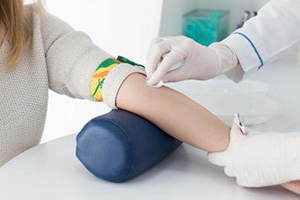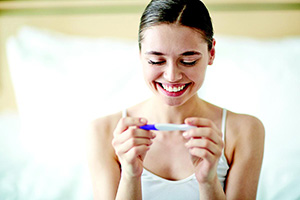The most favorable time for natural conception or puncture collection of an oocyte for its subsequent fertilization with spermatozoa in a test tube is the day of ovulation. The process of fusion of male and female reproductive cells takes about 24 hours, after which the most viable cells are selected from the newly formed diploid cells for growing in an incubator for 3-5 days.
 Planting five-day-old embryos into the uterine cavity increases the likelihood of conception several times. Sometimes experts decide to transfer embryos in two stages: on days 2 and 5 or on days 3 and 5. Thus, the chances of implantation of the ovum into the endometrium are increased by an average of 35%.
Planting five-day-old embryos into the uterine cavity increases the likelihood of conception several times. Sometimes experts decide to transfer embryos in two stages: on days 2 and 5 or on days 3 and 5. Thus, the chances of implantation of the ovum into the endometrium are increased by an average of 35%.
With a successful IVF procedure, as early as 12-13 days after ovulation (DPO), women may show the first signs of pregnancy. To confirm the fact of pregnancy, a test for the content of chorionic gonadotropin (hCG) is performed on days 12-14 after the transfer (DPP) of embryos for three or five days. A high concentration of the hormone indicates the implantation of a blastocyst into the uterus and the onset of pregnancy.
13 DPO is 7 or 9 days after replanting a three- or five-day embryo. Already during this period, after undergoing the IVF procedure, women can feel changes in the body. Depending on the degree of preparation of the ovum, its implantation into the endometrium takes from 10-24 hours to several days. After the embryo is introduced into the wall of the uterus, its cells begin to actively produce hCG, which causes hormonal changes in the body.
At 13 DPO, the following signs of pregnancy may appear:
- dizziness;
- weakness;
- abdominal cramps;
- headache;
- nausea and vomiting;
- frequent urination.
It should be borne in mind that on the 13th day after ovulation, women's sensations may differ. This is due to the fact that half of them belong to the category of subjective symptoms and arise against the background of nervous overstrain and excitement. Also, possible sensations in 13 DPO include drowsiness, insomnia, runny nose, mucous discharge from the vagina.
An increase in the level of tropic hormones in the body provokes changes in the functioning of the organs of the endocrine, reproductive, digestive and respiratory systems. The following are the possible sensations on day 13 after embryo transfer:
- increased basal temperature;
- constipation;
- tubercles of Montgomery;
- implantation bleeding;
- delayed menstruation;
- breast augmentation;
- darkening of the areola of the nipples.
 If they appear, it is recommended to do a pregnancy test and undergo an analysis for the hCG content. Chorionic gonadotropin is a kind of indicator of pregnancy, since its presence in the blood indicates the implantation of a blastocyst into the uterus.
If they appear, it is recommended to do a pregnancy test and undergo an analysis for the hCG content. Chorionic gonadotropin is a kind of indicator of pregnancy, since its presence in the blood indicates the implantation of a blastocyst into the uterus.
One to two weeks after receiving positive results of laboratory tests, women are sent for the first ultrasound scan to determine the place of implantation of the ovum and the features of its development.
HCG rate for 13 DPP
Normally, the content of chorionic gonadotropin gradually increases as the fetus develops. In the first trimester of the gestational period, the concentration of the hormone doubles every 2-3 days, but after the 12th week of pregnancy, its content gradually decreases. According to medical data, at 13 DPPs, hCG can range from 22 to 105 mU / ml.
It should be understood that for five-day-old hCG at 13 DPP will differ slightly from the values for three-day embryos. If the content of the hormone does not reach the lower threshold, this may indicate the fading of the pregnancy or the implantation of the embryo into the fallopian tube. Too high a concentration of hCG on 13 DPPs of five days often indicates multiple pregnancies.
At 13 DPP, the test is negative, and hCG is positive - what does this mean? Pharmacy tests have insufficient sensitivity and therefore the results obtained with their help may not correspond to reality. In a short period of pregnancy, the level of chorionic gonadotropin is low and therefore may not be determined using a test. In addition, a pregnancy test detects the presence of hCG in the urine rather than in the blood.
Reasons for increasing or decreasing hCG
A high or low concentration of the hormone in the blood serum indicates abnormalities in the development of the fetus and therefore requires additional examination by a reproductive physician. Too low level of hCG occurs when:
- abnormal development of the embryo;
- fading pregnancy;
- placental insufficiency;
- the development of endocrine disorders;
- ectopic pregnancy;
- high probability of spontaneous abortion.
If the hCG indicator exceeds normal values several times, in 80% of cases this signals the implantation of several fetal eggs into the uterus at once. In this case, the test for 13 DPPs of five days will show at least 300 mU / ml. More than 30% of multiple pregnancies end in spontaneous reduction of one or more embryos within 10-15 days. But if the content of the hormone increases significantly already in the second trimester of the gestational period, this may indicate the development of genetic diseases such as Edwardas or Down syndrome, as well as an increased risk of spontaneous abortion.
Conclusion
 To increase the chances of a successful implantation of the embryo into the uterus, it is recommended to be sedentary for 2 weeks after the IVF procedure.
To increase the chances of a successful implantation of the embryo into the uterus, it is recommended to be sedentary for 2 weeks after the IVF procedure.
In the case of conception, already at 13 DPO, women show the first signs of pregnancy: breast swelling, nausea, vomiting, increased basal temperature, lack of appetite, etc. You can make sure you have achieved the desired result if you pass the hCG test. If the indicator is in the range from 22 to 105 mU / ml, this indicates a successful conception and the course of pregnancy.
